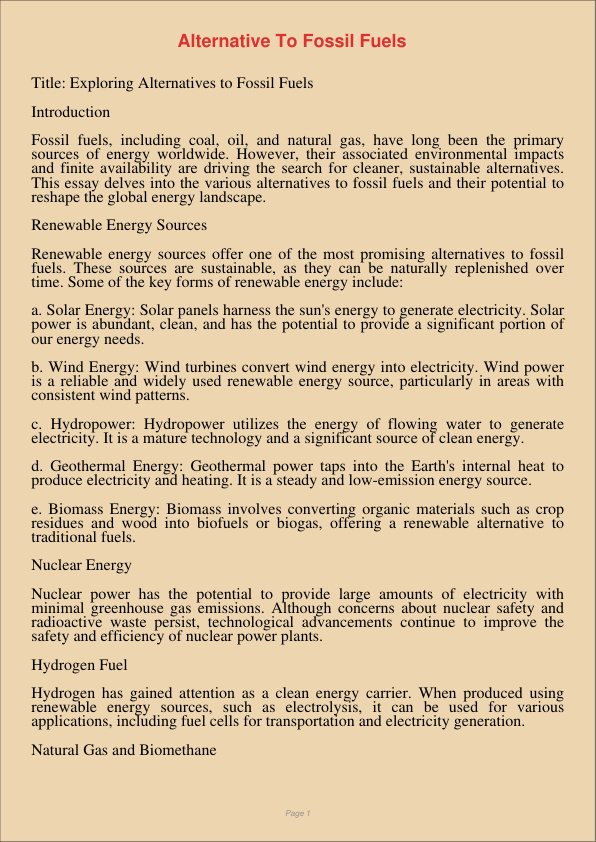Title: Exploring Alternatives to Fossil Fuels
Introduction
Fossil fuels, including coal, oil, and natural gas, have long been the primary sources of energy worldwide. However, their associated environmental impacts and finite availability are driving the search for cleaner, sustainable alternatives. This essay delves into the various alternatives to fossil fuels and their potential to reshape the global energy landscape.
Renewable Energy Sources
Renewable energy sources offer one of the most promising alternatives to fossil fuels. These sources are sustainable, as they can be naturally replenished over time. Some of the key forms of renewable energy include:
a. Solar Energy: Solar panels harness the sun’s energy to generate electricity. Solar power is abundant, clean, and has the potential to provide a significant portion of our energy needs.
b. Wind Energy: Wind turbines convert wind energy into electricity. Wind power is a reliable and widely used renewable energy source, particularly in areas with consistent wind patterns.
c. Hydropower: Hydropower utilizes the energy of flowing water to generate electricity. It is a mature technology and a significant source of clean energy.
d. Geothermal Energy: Geothermal power taps into the Earth’s internal heat to produce electricity and heating. It is a steady and low-emission energy source.
e. Biomass Energy: Biomass involves converting organic materials such as crop residues and wood into biofuels or biogas, offering a renewable alternative to traditional fuels.
Nuclear Energy
Nuclear power has the potential to provide large amounts of electricity with minimal greenhouse gas emissions. Although concerns about nuclear safety and radioactive waste persist, technological advancements continue to improve the safety and efficiency of nuclear power plants.
Hydrogen Fuel
Hydrogen has gained attention as a clean energy carrier. When produced using renewable energy sources, such as electrolysis, it can be used for various applications, including fuel cells for transportation and electricity generation.
Natural Gas and Biomethane
While natural gas is a fossil fuel, biomethane produced from organic waste offers a sustainable alternative. It can be used in the same applications as traditional natural gas, with reduced greenhouse gas emissions.
Advanced Biofuels
Advanced biofuels, such as cellulosic ethanol and algae-based fuels, offer renewable alternatives to gasoline and diesel. These fuels have the potential to reduce emissions and reliance on oil.
Energy Storage
Energy storage technologies, such as advanced batteries, play a crucial role in enabling the integration of intermittent renewable energy sources into the grid. They store excess energy for use when demand is high or renewable sources are unavailable.
Challenges and Considerations
While alternatives to fossil fuels hold immense promise, there are several challenges and considerations to address:
Infrastructure: Transitioning to alternative energy sources requires significant investments in infrastructure, including the development of renewable energy installations and electric vehicle charging networks.
Energy Storage: Efficient and cost-effective energy storage solutions are essential to ensure a reliable energy supply from intermittent sources like wind and solar.
Environmental Impacts: Some alternatives, like nuclear power and large-scale hydropower, have their own environmental and safety concerns that must be addressed.
Economic Factors: The economics of energy production and consumption, including subsidies and pricing mechanisms, play a crucial role in determining the adoption of alternatives.
Energy Efficiency: Enhancing energy efficiency across all sectors, from transportation to industry, is a key part of reducing our dependence on fossil fuels.
Conclusion
As we confront the pressing challenges of climate change and resource depletion, the quest for alternatives to fossil fuels has gained momentum. A combination of renewable energy sources, nuclear power, hydrogen, and sustainable biofuels, along with advancements in energy storage and energy efficiency, offer a diverse array of options to reduce our reliance on fossil fuels. The transition to these alternatives is not only an environmental imperative but also a pathway to a more sustainable and resilient energy future. It requires concerted efforts, technological innovation, and global collaboration to successfully replace fossil fuels and mitigate the environmental and economic risks they pose.

「真诚赞赏,手留余香」
真诚赞赏,手留余香
使用微信扫描二维码完成支付
